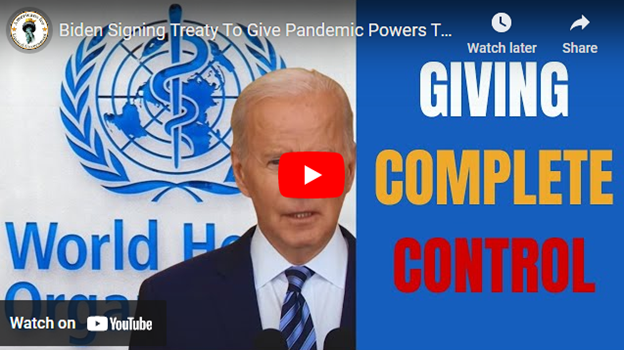Feb. 23, 2023
Permission to republish original opeds and cartoons granted.
Medicaid disenrollments for 20million added during Covid could take states at least a year after omnibusprovision, CMS guidance

By Robert Romano
Changes to federal law in the $1.7trillion omnibus spending bill will end the Medicaid “continuous enrollment”provision passed by veto-proof margins in 2020 in the Families First Coronavirus ResponseAct that prohibitedstates from disenrolling Medicaid patients even when they no longer qualified duringthe Department of Health and Human Services’ (HHS) public health emergencywhich began in March 2020.
As a result of the 2020 changes tolaw and regulations, Medicaid enrollment skyrocketed by 20.2 million to morethan 91 million since Feb. 2020, according to the latest data from theCenters for Medicare and Medicaid Services (CMS) compiled by the Kaiser FamilyFoundation, as 25 million jobs were temporarily lost and unemployment claims soared. The mechanism for the expansion appears to have beenautomatic enrollment when patients showed up to the hospital and other medicalservices without insurance during the pandemic.
It was Medicaid expansion larger thanthat even achieved under Obamacare during the entire period of expandedenrollment from 2010 through all of 2019, when the number went from 56 millionbefore the Affordable Care Act was passed, to 71 million in 2019. It hadreached 75 million in 2016, but continued decreases of the unemployment rateduring the Trump years drove down the means-tested eligibility of the programbefore the steep Covid recession.
Now, with the public health emergencyending on May 11 and under Section 5131 of Subtitle D of the$1.7 trillion omnibus,after March 31 of this year, states are finally allowed to resume verifying incomeof recipients resulting in redeterminations of eligibility as increased federalspending for Medicaid is phased out.
CMS has estimated that as many as 15million patients could be disenrolled but in its latest guidance worries that “Without updated contactinformation, notices, renewal packets, and/or requests for additionalinformation may not reach individuals who have moved, leading to inappropriatecoverage loss among individuals still eligible for coverage.” And so, Congresscreated a way to keep millions of patients continually enrolled in Medicaid foras long as possible even if Managed Care Organizations (MCOs) are unable to getin touch with them.
The law requires prohibits“disenroll[ment] from the State plan or waiver any individual who is determinedineligible for medical assistance under the State plan or waiver pursuant tosuch a redetermination on the basis of returned mail unless the State firstundertakes a good faith effort to contact the individual using more than onemodality.” That is at least two attempted points of contact, say, by mail andby phone, but states could use more than two if they choose. The law providesno upper limit on how many modalities may be used. This is a condition ofcontinuing to receive the increased federal funding for the Covid Medicaidexpansion, which will phase out completely on December 31.
One of the goals of the phased-outdisenrollment period is to transition recipients currently on Medicaid tofederally subsidized insurance under the Affordable Care Act prior todisenrollment, further cementing the expansion of socialized medicine in theU.S.
But reaching patients is the problemin general. More than two-thirds of Medicaidrecipients receive their care from the outsourced Managed Care Organizations(MCOs), but onlyone-third in a Kaiser Family Foundation survey reported having up to date contactinformation for above 76 percent patients. Meaning about 45 percent of MCOscannot reach their patients. That’s because many of them don’t answer the phoneor email or have changed their address since they were enrolled in the program.According to the survey’s results, “Nearly all responding plans said thatreaching Medicaid beneficiaries is a challenge.”
This could create a perverseincentive for MCOs — which have a financial incentive to have as many enrolleesas possible even it overworks the system and delivers poorer patient outcomes —to leave patients enrolled for as long as possible. Essentially, there will bean underground railroad of activists in the system advocating to keep peopleinside, even if it turns out they were dead, in jail or not even in the stateanymore.
This will also likely create apolitical push at the state level to find other ways to leave the apparitionalrecipients in the system, not to mention the new potential constituency of morethan 20 million new enrollees who won’t like losing their coverage that stateofficials might be afraid to take on or else why haven’t they already?
Good luck with getting them out ofthe system. Maybe somebody should have spoke up about this sooner.
Depending on the state and how thedisenrollments are carried out — for example, Florida states that it cannot get intouch with as many as 850,000 Medicaid recipients — that could either mean rapid ifnot quiet disenrollments, or the conjuring of multitudes of excuses for whymany of the recipients do not end up being disenrolled.
Another unintended consequence of theprovision is that recipients could have a perverse incentive to either concealincome—which could be off the books—or to become or remain unemployed tocontinue qualifying for the program.
It’s almost as if had Republicans in Congress and Republican state governors been raising the alarm bells aboutthe continued enrollment provision in the first place — I cannot find a singleRepublican elected representative or state executive who professes to opposesocialized medicine to have even acknowledged let alone complain about thisprovision between its 2020 enactment and the passage of the $1.7 trillionomnibus at the end of 2022, calling into question whether they were even awareof this massive expansion of socialized medicine, or else why didn’t they sayanything? — then the new Congress might have been able to deal with this in2023 and states might have been better prepared to deal with what almostcertainly will be a bureaucratic if not a political trainwreck.
Robert Romano is the Vice Presidentof Public Policy at Americans for Limited Government Foundation.
Cartoon: Helter Stelter
By A.F. Branco

Click here to view a higherresolution version.
To view online: https://dailytorch.com/2023/02/cartoon-helter-stelter/
Video: Biden Signing Treaty To GivePandemic Powers To World Health Organization

To view online: https://www.youtube.com/watch?v=NZcYjAb8muE

WHO Pandemic Agreement abrogates U.S.sovereignty without Senate vote
Feb. 22, 2023, Fairfax, Va.—Americansfor Limited Government President Rick Manning today issued the followingstatement in opposition to the draft World Health Organization (WHO)Pandemic Agreement:
“Americans for Limited Governmentopposes President Joe Biden’s negotiated draft agreement with the World HealthOrganization that abrogates U.S. sovereignty without any Senateratification. Article 4, Section 3 of the draft clearly statesthat the United States and other signatories would retain sovereignty, but only‘provided that activities within their jurisdiction or control do not causedamage to their peoples and other countries.’
“In other words, America would retainour sovereignty so long as it complies with the measures that WHOrecommends. It even allows for provisional adoption of the agreementin Article 35 to expedite implementation.
“Toward the end of protecting theSenate’s advice and consent process on treaties, Senator Ron Johnson hasintroduced legislation the ‘No WHO Pandemic PreparednessTreaty Without Senate Approval Act’ which we wholeheartedly support. Additionally, we urgethe House and the Senate to end U.S. financial support to the World HealthOrganization should President Biden press ahead on this disastrous shatteringof our liberties under the U.S. Constitution.
“It is clear that President Bidenintends to sign and follow the WHO Pandemic Agreement without submitting it tothe Senate, and it is incumbent on Congress to send the current president astrong message that he cannot trade away our nation’s freedoms to unaccountablethird party actors.”
Toview online: https://getliberty.org/2023/02/who-pandemic-agreement-abrogates-u-s-sovereignty-without-senate-vote/


